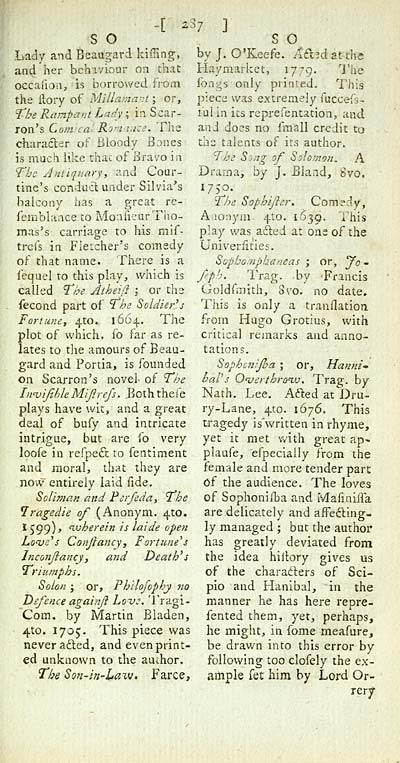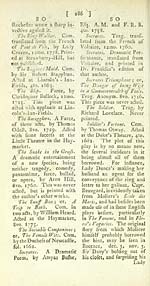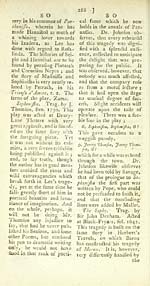Glen Collection of printed music > Printed text > New theatrical dictionary
(301) Page 287
Download files
Complete book:
Individual page:
Thumbnail gallery: Grid view | List view

-[ 23
S O
Lady and Beaugard killing,
and her behaviour on that
occafion, is borrowed from
the ftory of Millamant', or,
The R amp a nt La dy ; i n S c a r -
ron's Cornea, Rbmante. The
character of Bloody Bones
is much like thac of Bravo in
The Antiquary, and Cour-
tine's conduct under Silvia's
balcony has a great re-
femblance to Moniieur Tho-
mas's carriage to his mif-
trefs in Fletcher's comedy
of that name. There is a
fequel to this play, which is
called The Atheifi ; or the
fecond part of The Soldier's
Fortune, 4to. 1 664. The
plot of which, fo far as re-
lates to the amours of Beau-
gard and Portia, is founded
on Scarron's novel of The
InvifibleMiftrefs. .Boththefe
plays have wit, and a great
deal of bufy and intricate
intrigue, but are fo very
loofe in refpect to fentiment
and moral, that they are
now entirely iaid fide.
Soliman and Perfeda, The
7ragedie of (Anonym. 4to.
1 599) » iv herein is laide open
Love's Confa?icy i Fortune's
Inconftancy, and Death' 's
Triumphs.
Solon ; or, Philofophy no
Defence againfl Love. Tragi-
Com. by Martin Bladen,
4to. 1705. This piece was
never adled, and even print-
ed unknown to the author.
The Son-in-Laiv. Farce,
7 ]
S O
by J. G'Keefe. ACtid at the
Haymarket, 1779. The
fong's only primed. This
piece was extremely fuccefs-
iul in its reprefentation, and
and does no fmall credit to
the talents of its author.
The Song of Solomon. A
Drama, by J. Bland, 8vo.
1750.
The Sophifer. Comedy,
Anonym. 4to. 1639. This
play was acled at one of the
Univerfities.
Sophornphaneas ; or, fo~
fph. Trag. .by 'Francis
Goldfmith, 8vo. no date.
This is only a tranilation
from Hugo Grotius, with
critical remarks and anno-
tations.
Sophcnijba ; or, Hanni<-
bar s Overthrow. Trag. by
Nath. Lee. A&ed at Dru-
ry-Lane, 4to. 1676. This
tragedy is'written in rhyme,
yet it met with great ap-
plaufe, efpecially from the
female and more tender part
Of the audience. The loves
of Sophonilba and MalinifTa
are delicately and affe&ing-
ly managed ; but the author
has greatly deviated from
the idea hiitory gives us
of the characters of Sci-
pio and Hanibal, in the
manner he has here repre-
fented them, yet, perhaps,
he might, in fome meafure,
be drawn into this error by
following too clofely the ex-
ample fet him by Lord Or-
rery
S O
Lady and Beaugard killing,
and her behaviour on that
occafion, is borrowed from
the ftory of Millamant', or,
The R amp a nt La dy ; i n S c a r -
ron's Cornea, Rbmante. The
character of Bloody Bones
is much like thac of Bravo in
The Antiquary, and Cour-
tine's conduct under Silvia's
balcony has a great re-
femblance to Moniieur Tho-
mas's carriage to his mif-
trefs in Fletcher's comedy
of that name. There is a
fequel to this play, which is
called The Atheifi ; or the
fecond part of The Soldier's
Fortune, 4to. 1 664. The
plot of which, fo far as re-
lates to the amours of Beau-
gard and Portia, is founded
on Scarron's novel of The
InvifibleMiftrefs. .Boththefe
plays have wit, and a great
deal of bufy and intricate
intrigue, but are fo very
loofe in refpect to fentiment
and moral, that they are
now entirely iaid fide.
Soliman and Perfeda, The
7ragedie of (Anonym. 4to.
1 599) » iv herein is laide open
Love's Confa?icy i Fortune's
Inconftancy, and Death' 's
Triumphs.
Solon ; or, Philofophy no
Defence againfl Love. Tragi-
Com. by Martin Bladen,
4to. 1705. This piece was
never adled, and even print-
ed unknown to the author.
The Son-in-Laiv. Farce,
7 ]
S O
by J. G'Keefe. ACtid at the
Haymarket, 1779. The
fong's only primed. This
piece was extremely fuccefs-
iul in its reprefentation, and
and does no fmall credit to
the talents of its author.
The Song of Solomon. A
Drama, by J. Bland, 8vo.
1750.
The Sophifer. Comedy,
Anonym. 4to. 1639. This
play was acled at one of the
Univerfities.
Sophornphaneas ; or, fo~
fph. Trag. .by 'Francis
Goldfmith, 8vo. no date.
This is only a tranilation
from Hugo Grotius, with
critical remarks and anno-
tations.
Sophcnijba ; or, Hanni<-
bar s Overthrow. Trag. by
Nath. Lee. A&ed at Dru-
ry-Lane, 4to. 1676. This
tragedy is'written in rhyme,
yet it met with great ap-
plaufe, efpecially from the
female and more tender part
Of the audience. The loves
of Sophonilba and MalinifTa
are delicately and affe&ing-
ly managed ; but the author
has greatly deviated from
the idea hiitory gives us
of the characters of Sci-
pio and Hanibal, in the
manner he has here repre-
fented them, yet, perhaps,
he might, in fome meafure,
be drawn into this error by
following too clofely the ex-
ample fet him by Lord Or-
rery
Set display mode to: Large image | Transcription
Images and transcriptions on this page, including medium image downloads, may be used under the Creative Commons Attribution 4.0 International Licence unless otherwise stated. ![]()
| Special collections of printed music > Glen Collection of printed music > Printed text > New theatrical dictionary > (301) Page 287 |
|---|
| Permanent URL | https://digital.nls.uk/90318977 |
|---|
| Description | Scottish songs and music of the 18th and early 19th centuries, including music for the Highland bagpipe. These are selected items from the collection of John Glen (1833 to 1904). Also includes a few manuscripts, some treatises, and other books on the subject. |
|---|
| Description | The Glen Collection and the Inglis Collection represent mainly 18th and 19th century Scottish music, including Scottish songs. The collections of Berlioz and Verdi collected by bibliographer Cecil Hopkinson contain contemporary and later editions of the works of the two composers Berlioz and Verdi. |
|---|

